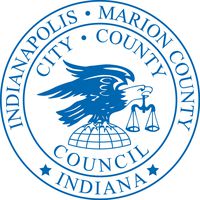Researchers at the Indiana University Public Policy Institute have released the results of a five-month study designed to measure and assess the effectiveness of the Indianapolis-Marion County City-County Council.
From June to October 2019, Professors Amanda Rutherford and Cullen Merritt from the Paul H. O'Neill School of Public and Environmental Affairs collected information through an online survey of city and county residents, citizen focus groups, and interviews with city and county leaders.
“Collecting information in multiple ways and in different settings enabled us to conduct an objective and well-rounded assessment of the council,” said Merritt.
Rutherford added, "This report will help the council to consider strategic changes that have the potential to foster strong performance in some areas and navigate barriers to effectiveness in others.”
Through their research, four key areas of improvement emerged:
- Better utilize technology to connect with constituents. The council could make better use of technology to communicate with stakeholders and should consider reviewing its website to improve navigation to information. Additionally, the council should consider how to enhance access for residents who can’t use the council’s online platforms.
- Increase strategic outreach and public communication. The council should consider engaging in outreach efforts with constituents by working with media, creating newsletters, and using social media to offer substantive council updates.
- Maximize operating efficiency by considering staffing and compensation levels. The limited number of paid staff members may impact how much the council can achieve in a given year. Furthermore, increased compensation may allow those elected to devote more time to serving constituents.
- Review strategies to engage and collaborate with local agencies and organizations. Interviews with city-county agency leaders showed they wanted to both learn from and educate councilors on issues specific to their agencies.
The researchers conducted 29 interviews with city and county leaders from August 1–30, 2019. They interviewed several councilors as well as representatives from the executive and judicial branches, and the private and nonprofit sectors. Interview questions focused on council structure and effectiveness, public engagement, and council representation.
Researchers also hosted five citizen focus groups from September–October 2019 at various branches of the Indianapolis Public Library. In total, 28 people participated and discussed council responsibilities and effectiveness, local policy issues, and council characteristics, representation, and communication.
In addition, about 600 Marion County residents completed an online survey with 105 questions. Those participants displayed different levels of trust in local, state, and federal government. They reported higher levels of trust for the council as compared to state and federal elected officials. The council could use this trust to cultivate meaningful relationships with residents.
Survey results also found that the racial/ethnic composition of the council was rated as most representative while the socioeconomic status of the council was perceived as least representative of the community. The same held true for perceptions of individual councilors.
For council outreach efforts, more than 40 percent of all respondents agreed that the council and its members try to interact with the public to understand current issues. Further, 38 percent agreed that the council tried to get public feedback on policy changes or proposals, while 35 percent said the same of their representative. A minority of respondents said the council did an above average or excellent job reaching out via local news, the website, email/mail, or social media.
All 600 survey respondents were asked to rank 12 issues in order of importance—387 elected to assign rankings. Public works, public safety, education, and economic development had the highest overall rankings.



